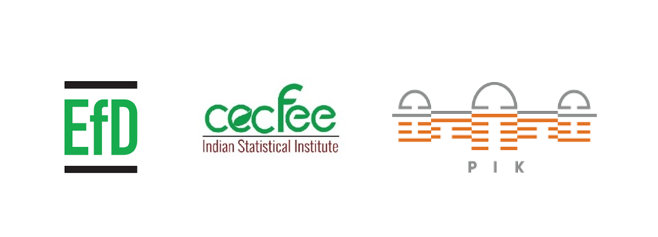Workshop on Climate Policy in Low- and Middle-Income Countries: Challenges and Opportunities

Workshop on Climate Policy in Low- and Middle-Income Countries: Challenges and Opportunities
Pre-Conference Workshop - 30th Annual Conference of the European Association of Environmental and Resource Economists
Date: June 16, 2025 from 9:00 am to 1:00 pm
Location: Norwegian School of Economics - NHH, Bergen (Norway)
AUDITORIUM O
The Climate Policy for Development Initiative within the Environment for Development Initiative is pleased to announce a pre-EAERE workshop on climate policy in low- and middle income countries.
Introduction and Motivation: Climate policy in low- and middle-income countries (LMICs) is increasingly critical as these nations contribute a growing share of global emissions through rapid industrialization and economic expansion. LMICs face unique policy environments and socio-economics realities that complicate the formulation and implementation of effective climate policies. These challenges include lower institutional quality, which hampers policy enforcement and compliance; a high prevalence of state-owned enterprises that may resist market-based interventions; limited opportunities for price pass-through, making mechanisms like carbon pricing less effective; and the coexistence of multiple policy issues and externalities, such as severe air pollution, which require immediate and multifaceted solutions.
Current Challenges in LMIC Climate Policy: The literature only slowly recognizes particular challenges for LMICs when it comes to climate mitigation policies (Caucheteux et al., 2025). The effectiveness of first-best climate policies, typically designed with high-income countries in mind, remains uncertain when applied to LMICs. Primary studies that focus on LMICs are scarce (Stechemesser et al., 2024; Döbbeling-Hildebrandt et al., 2024). Yet, existing theory fails to account for potentially decisive key aspects in LMICs. Factors such as informal markets (Bento et al., 2018), the heavy reliance on biomass for cooking and energy (Greve and Lay, 2023), high capital costs (Hirth and Steckel, 2016) or the prevalence of lobbies (Kalkuhl et al. 2020) complicates the adoption of conventional carbon pricing, and – related – revenue recycling. Institutional weaknesses and economic constraints in LMICs might necessitate innovative approaches to carbon pricing. Some even argue that carbon pricing should not be pursued, at least in the poorest countries (Ankel-Peters et al., 2025).
Workshop Goals: The workshop will delve into the nuanced application of climate mitigation policies in LMICs. It will discuss how policy instruments, such as carbon pricing mechanisms, can be adapted to local contexts, emphasizing that rigid application of policies designed for high-income countries can lead to inefficiencies and inequities. It will discuss the economic and policy rationale of innovative strategies such as tiered pricing, or the implementation of complementary measures to support fossil-fuel dependent sectors and biomass-dependent households.
This workshop aims to deepen the understanding of the fundamental differences between optimal climate policies in LMICs and those in developed countries, considering variations in institutional capacity, economic structure, and social dynamics. By integrating findings from recent comprehensive reviews and data analyses, the workshop seeks to identify critical research gaps and outline the necessary steps to develop actionable and just climate policies tailored to the unique contexts of LMICs. Participants will engage in an in-depth examination of specific elements such as biomass dependency, the prevalence of informal markets, and high capital costs in the energy sector, which necessitate specialized policy approaches. Additionally, the workshop aspires to foster collaborative solutions by bringing together researchers, policymakers, and practitioners to develop innovative strategies that address the multifaceted challenges of implementing climate policies in LMICs. Ensuring that these policies not only mitigate emissions but also promote social equity and sustainable development within LMICs will be a central focus, supported by the latest empirical research and policy analyses.
Target audience and Structure: The workshop will feature keynote presentations followed by panel discussions organized in three blocks:
-
Effectiveness of carbon pricing mechanisms;
-
Feasibility and acceptability of compensation schemes;
-
Optimal carbon pricing in the context of multiple externalities.
The workshop targets researchers in environmental economics (i.e. EAERE participants), editors of journals and people working at the science policy interface. We aim to create a community of scholars that thinks deeply about how to apply economic concepts on climate change mitigation in the context of LMICs.
These sessions start at 9am and will provide participants with the opportunity to engage in collaborative discussions aimed at identifying best practices and formulating recommendations for future research and policy development. At 1pm a short lunch will be provided.
Speakers include Raaavi Aggarwal (Indian Statistical Institute), Stefano Carattini (Georgia State University), Moritz Drupp (ETH Zurich), Carolyn Fischer (World Bank), Nicolas Koch (PIK Potsdam) and Anant Sudarshan (U Warwick).
All interested participants are welcome. Due to limited seating capacities, please register with Anjali Ramakrishnan (anjali.ramakrishnan@efd.gu.se) until June 6th.
Organizers: E. Somanathan (Centre for Research on the Economics of Climate, Food, Energy and Environment, ISI Delhi), Jan Christoph Steckel (MCC, Potsdam Institute for Climate Impact Research) and Thomas Sterner (Environment for Development, University of Gothenburg).
References:
Ankel-Peters, J., Bensch, G., Dabadge, A., Munyehirwe, A., Rose, J., Sievert, M., ... & Lay, J. (2025). Tax carbon cautiously for sub-Saharan Africa. Nature Climate Change, 15(1), 7-9.
Bento, A. M., Jacobsen, M. R., & Liu, A. A. (2018). Environmental policy in the presence of an informal sector. Journal of Environmental Economics and Management, 90, 61-77.
Caucheteux, J., Fankhauser, S., & Srivastav, S. (2025). Climate Change Mitigation Policies for Developing Countries. Review of Environmental Economics and Policy, 19(1), 000-000.
Döbbeling-Hildebrandt, N., Miersch, K., Khanna, T. M., Bachelet, M., Bruns, S. B., Callaghan, M., ... & Minx, J. C. (2024). Systematic review and meta-analysis of ex-post evaluations on the effectiveness of carbon pricing. Nature Communications, 15(1), 4147.
Greve, H., & Lay, J. (2023). “Stepping down the ladder”: The impacts of fossil fuel subsidy removal in a developing country. Journal of the Association of Environmental and Resource Economists, 10(1), 121-158.
Hirth, L., & Steckel, J. C. (2016). The role of capital costs in decarbonizing the electricity sector. Environmental Research Letters, 11(11), 114010.
Kalkuhl, M., Steckel, J. C., & Edenhofer, O. (2020). All or nothing: Climate policy when assets can become stranded. Journal of Environmental Economics and Management, 100, 102214.
Stechemesser, A., Koch, N., Mark, E., Dilger, E., Klösel, P., Menicacci, L., ... & Wenzel, A. (2024). Climate policies that achieved major emission reductions: Global evidence from two decades. Science, 385(6711), 884-892
Last update on March 18, 2025 |





